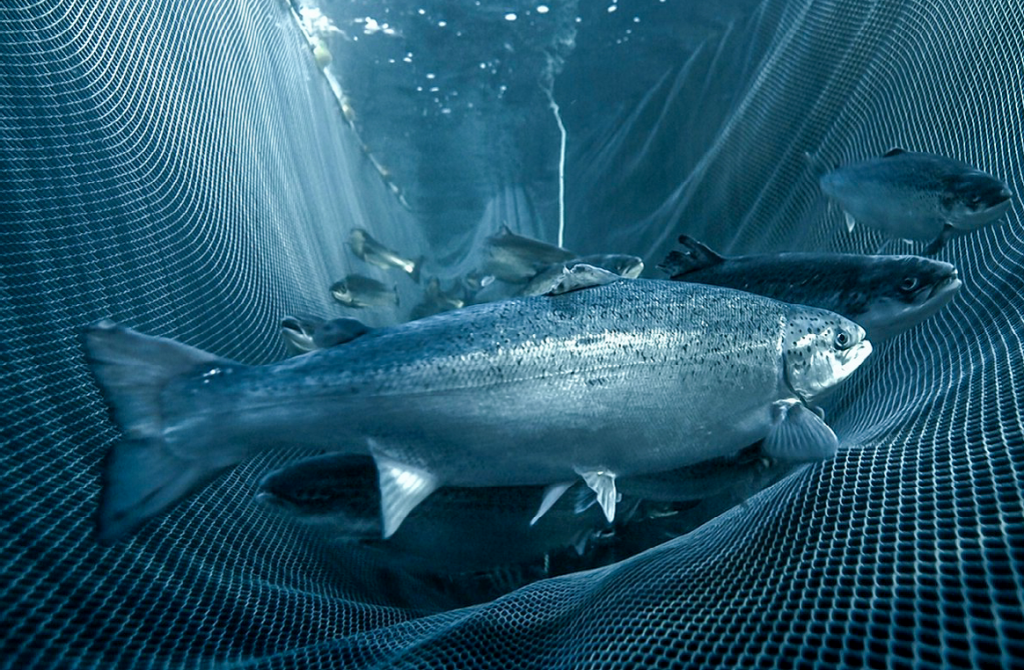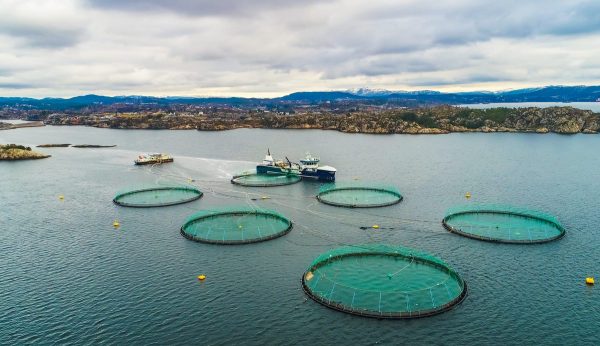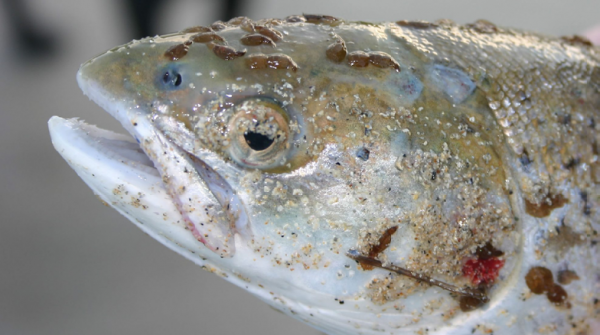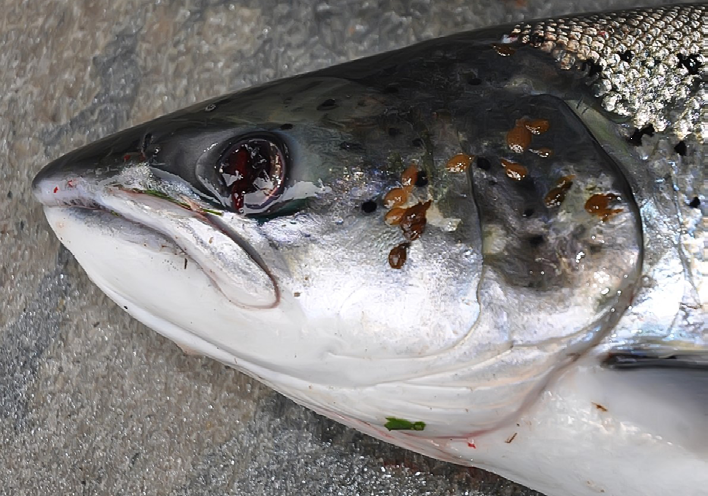New Technologies
New Technology and Future Direction
New technology and the future direction of salmon farming must encompass a physical barrier between the farmed salmon and the wider environment. Regarding new technologies, closed containment systems using re-circulation systems (RAS) and semi-closed containment (s-CCS) appear to be the great hope but again this technology has proved difficult to scale up to production targets set by open net cages.
Semi-closed containment systems at sea appear to be the direction which may form the future basis of production but again the technology appears to be not adequately refined or developed to effectively persuade the industry that abandoning open-net cage farming is a desired way that their business should proceed. This attitude is also the case for regulatory authorities Many new technologies are being developed to overcome issues with the environment but alas it appears that much of this is to expand the industry rather than replace the open net cages. In short the attitude of this industry is to protect their economic interest and not wild salmonids or indeed the near coastal environment.
Other Technologies
Some interesting new technologies include the use of deep ocean technologies including the building of what is essentially a floating ship which will act as a farm having a capability to keep the salmon at a depth of 10 meters to lessen impact of sea lice. Other technologies include submerged cages at up to 300 meters depth. Indeed Marine Harvest has applied for 14 licenses in Norway towards an egg-shaped, semi-closed farming concept.
Larger Smolts
The use of RAS systems on land to raise salmon smolts to a large size before transfer to open net cages at sea has been proposed which might consist of a regime whereby the smolts could be up to a 1kg in weight before transfer to the sea. This might effectively deal with some of the issues as they would spend a considerably shorter period at sea and could be chemically treated to inhibit lice impact prior to sea introduction and could be stocked so as to avoid the critical period of the wild smolt migration.
Sustainability
However, the very important question must also be asked as to the sustainability of an industry which is effectively rearing a salmon; a top, carnivore predator which requires the input of a very substantial amount of protein (fish/shellfish) from a finite marine biomass in order to attain market size. In effect, the input required to rear these fish far outweighs the output and is not in any way sustainable.

Open Net cages allow patogens and parasites easy and free access thus causing economic, environmental and animal welfare problems for farmed salmon. Cages are a reservoir for harm to wild salmonids.
New Technology and Future Direction : Ireland and International Focus
Many studies have been conducted, both desk based and physical research, on closed containment and semi-closed containment technologies and how production can be effectively changed to protect farmed salmon and Salmon Watch Ireland have developed a resource which can be accessed here. New Technologies This outlines our verdict on the various technologies and strategies available. It must be stressed that these new technologies are being developed to protect the industry primarily rather than wild salmonids.
In other countries like Norway and Scotland a level of production exists which is having a substantial effect on the near shore ecosystem thus requiring more innovative solutions to allow their industry expand. Primarily the focus is to expand these industries through new technologies in order that industry can keep pace with demand. We have not reached that environmental situation as yet in Ireland but official policy is to rapidly expand the industry here thus creating a situation which cannot be allowed to happen for both environmental and economic reasons. Ireland can be an example to the world if we embrace new technologies and abandon open net cage farming.
The Future
Ireland's Future in Salmon Farming
So where do we go from here? Rationally, Ireland has four possible paths to take:
1. The withdrawal of all licences for open-net pen aquaculture and replacement with green technologies. This may require a transition period but without proper legislation and enforcement damage to wild fish will continue.
2. The banning of salmon farming at sea and moving the industry onto land.
3. Do nothing and expand the industry at sea.
4. Ban salmon farming outright and reclaim our unique coastal ecosystems.
Unfortunately the third option appears to be the preferred choice of our government and certainly (naturally) the choice of the various companies operating here. With very poor regulatory rules and lack of legally enforceable penalties enshrined in legislation, fin fish farming will continue to cause untold damage to Ireland’s stocks of wild salmon and sea trout while also contributing to the damage of the wider environment.
Failing our Sustainable Economic Future : Rural Ireland
The fish farming business is also affecting our once considerable but quickly vanishing angling tourism product and if not curtailed and effectively controlled this country will have no economic benefit from salmon and sea trout angling.
Closing or significantly curtailing open-net fish farming at sea will certainly cause hardship to localised economies but there are alternatives, through semi-closed containment or closed containment, to protect these jobs and even expand the industry but that decision lies with the large companies which may not feel obliged to invest in new safer technologies due to a lack of Government legislation and enforcement, as well as, always, profitability.

Open net pen farming is the normal but outdated technology used in 100% of Irish finfish aquaculture. New technology and new ways of producing fish is required.
Salmon Farming : An Industry which is out of Control
The continued assault on a rapidly dwindling salmon stock and the near extinction of sea trout is immoral in the extreme and is directly as a result of this industry and we need to organise and meet, head-on, the very considerable job of changing government policy in regard to this industry. The political and social unrest regarding open net pen salmon farming on the east and west coast of North America, and indeed Scotland and Norway, must not be ignored by our own politicians.
Why would any politician want to continue or for that matter expand an industry which has laid waste to vast areas of oceanic ecosystem and caused the virtual destruction of both wild salmon and sea trout in this jurisdiction and internationally?
We must demonstrate that there is another way and show that continuation of farming as it is will not enhance their electoral performance. We all need to impress upon all our politicians, through direct action if necessary, on the harm these companies are doing to our precious natural ecosystems.
New Technology and Future Direction : Need for change and action.
The new technologies may not solve all the issues in regard to salmon abundance but we must give these fish more robust protection from this industry in the real hope that we can honestly say that we have tried to enhance their near coast survival by embracing new approaches.
We at Salmon Watch Ireland can and will help but we need all concerned citizens to organise under one movement and use the very considerable goodwill that exists in our tourism bodies, scientific community and legal sector.
Salmon Watch Ireland is sure that all anglers, tourism business owners, conservationists, scientists and concerned citizens can be mobilised.


